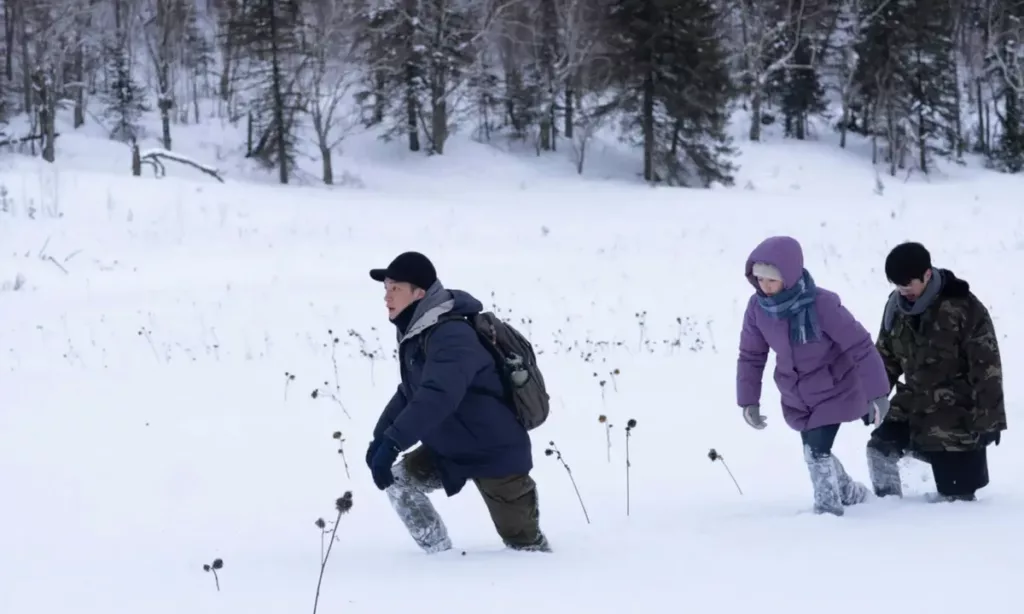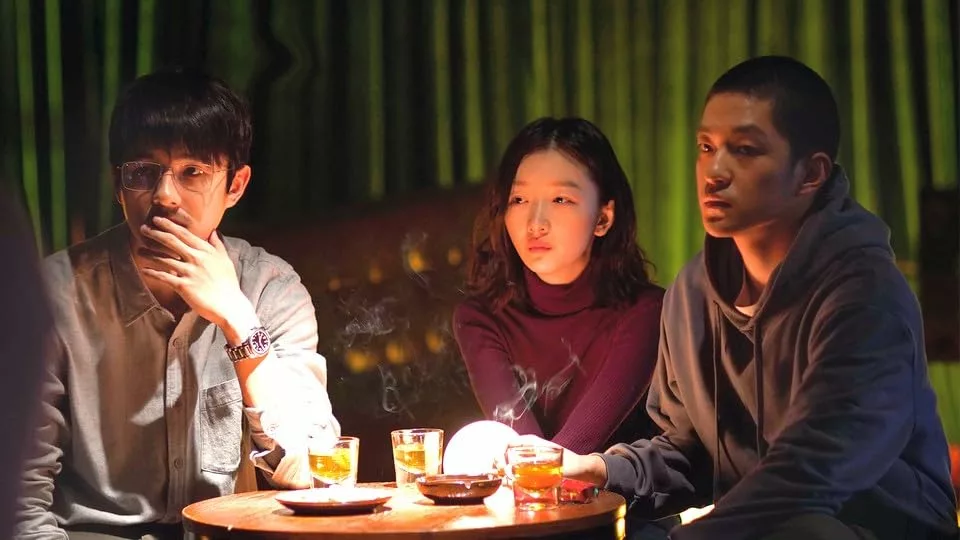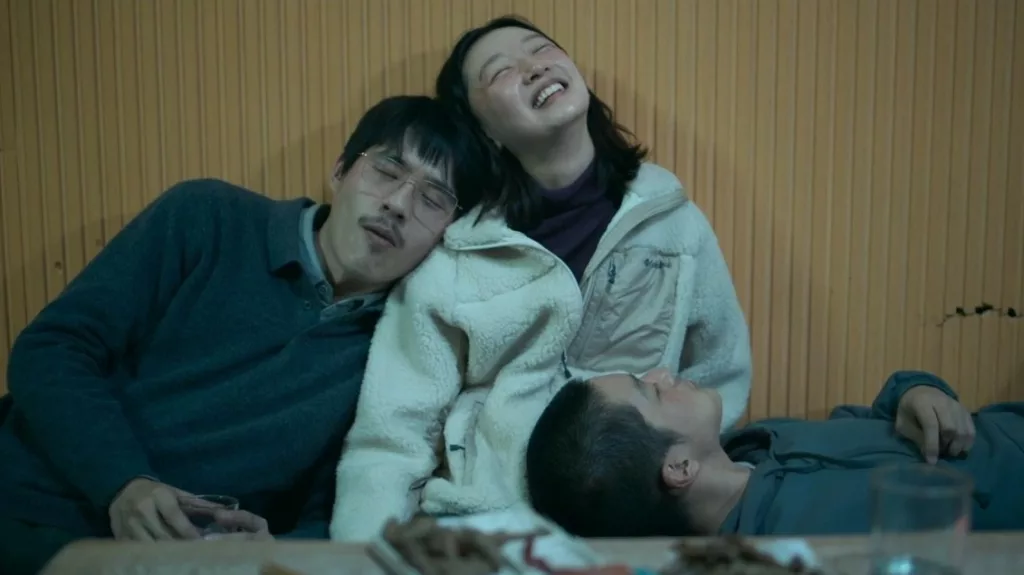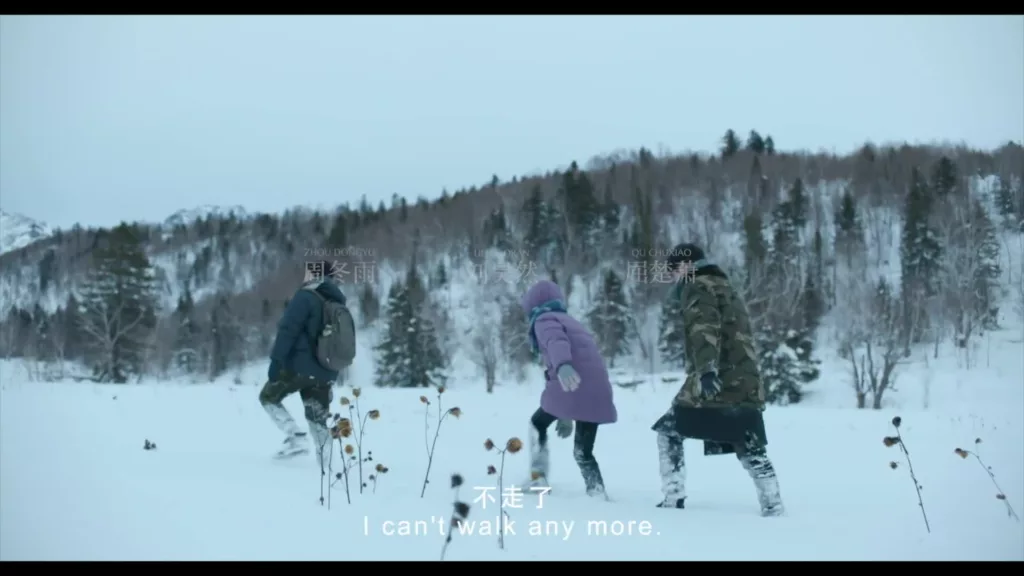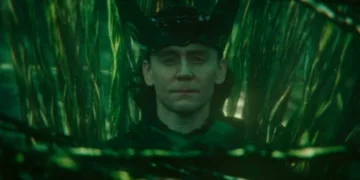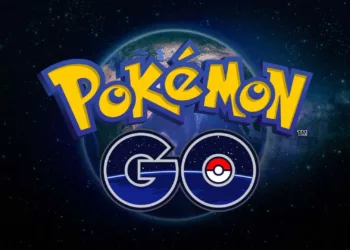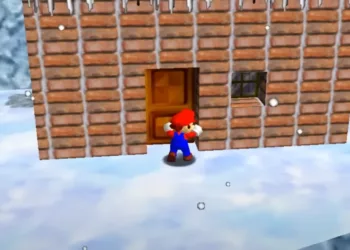After winning the prestigious Caméra d’Or award at Cannes in 2013 for his intimate family drama “Ilo Ilo,” Singaporean writer-director Anthony Chen makes a triumphant return to the festival a decade later. His latest film, “The Breaking Ice,” premiered in the Un Certain Regard section, garnering strong critical acclaim. Chen has crafted a tender humanist drama that explores the aimlessness of modern Chinese youth looking to break free from feelings of isolation and despair.
Set against the frigid backdrop of Yanji, a Chinese border town near North Korea, the film centers on a chance encounter between three lost souls. Zhou Dongyu stars as Nana, a weary tour guide going through the motions of a job she’s grown to resent. After a disappointing end to her competitive ice skating ambitions, she remains frozen emotionally. Liu Haoran plays Haofeng, a depressed businessman from Shanghai struggling with suicidal thoughts. And Qu Chuxiao is Xiao, Nana’s friend who dropped out of school to work at his aunt’s restaurant, feeling trapped in Yanji.
Over the course of one alcohol-fueled weekend, these three form a connection that begins to thaw their frozen hearts. As they wander through this unique border city with a blend of Chinese and Korean culture, they open up about their personal demons and unrealized dreams. Chen returns to the gentle slice-of-life approach that made “Ilo Ilo” so affecting, crafting an intimate generational portrait that resonates beyond cultural boundaries. With its well-drawn characters and emotional authenticity, “The Breaking Ice” heralds the welcome return of a singular filmmaking voice.
Finding Hope in the Border Town Deep Freeze
The aptly-titled “The Breaking Ice” takes place in the frigid border city of Yanji in northeastern China, nestled up against icy North Korea. Director Anthony Chen focuses on three young Chinese outsiders who forge a soul-stirring friendship over one serendipitous weekend that just may break them out of their frozen despair.
We first meet Nana (Zhou Dongyu), a restless 20-something who gave up competitive figure skating after a failed performance shattered her dreams years back. Now, she works as a tour guide in Yanji through gritted teeth, going through the motions with tourists visiting the city’s Korean historical sites and culture. She seems brittle and closed-off, resentful of the daily grind she’s stuck herself in.
When a visitor from Shanghai named Haofeng (Liu Haoran) finds himself stranded in Yanji after losing his phone, Nana offers her home to him for the night. Haofeng is clearly grappling with deep depression – chewing on ice cubes obsessively and dodging calls from a mental health clinic back home. What brings this guarded, suicidal young businessman to befriend the prickly Nana remains an intriguing mystery.
Nana’s childhood friend Xiao (Qu Chuxiao) gets folded into the mix when she brings Haofeng to the Korean restaurant where Xiao works. A high school dropout pursuing his own uninspired path, Xiao carries a torch for Nana that she refuses to acknowledge. Over drinking and karaoke, the three bond through the pain that life has frozen them in.
As the weekend unfolds, they inch closer in telling truths about themselves – a failed ice skating dream, a mind on the brink, a future put on hold. The desolate yet culturally distinct city of Yanji becomes the perfect backdrop reflecting the in-between uncertainty of millennials struggling to break through the ice and rekindle their spark. Through unexpected human connection, they just might melt their frozen hearts.
Searching for Connection in the Deep Freeze
At its heart, “The Breaking Ice” explores profound themes of isolation and longing through the lens of troubled Chinese youth. All three protagonists face a kind of emotional paralysis – stuck in place, unable to break through the layers of ice that have formed around their tender souls. Director Anthony Chen zeroes in on quiet moments of introspection and bonds slowly built between strangers to bring warmth to these solitary lives.
Cinematographer Yu Jin-Pin lenses the film with sensuous intimacy, embracing handheld close-ups that study the minute shifts in facial expressions. The camera caresses the anguished creases around Zhou Dongyu’s eyes as Nana watches figure skaters practice on a frozen lake, reflecting on the loss of her own once-promising skating aspirations. In a soul-stirring scene set in Nana’s cramped apartment, Liu Haoran’s Haofeng averts his eyes as he finally admits to being treated for depression. The hazy lighting and tight shot magnify his vulnerability, resonating with anyone who has suffered mental health issues in silence and shame.
Rather than spelling out backstories through exposition, Chen droplets in detail through natural dialogue and introspective gazes. When the three friends visit a zoo, Nana remarks on the North Korean leopards in captivity who pace endlessly back and forth, their confinement slowly driving them mad. The obvious metaphor for the trio’s own self-imposed isolation is poetic rather than overstated.
Chen also pays loving homage to the drifting, ephemeral mood of French New Wave classics like Truffaut’s “Jules and Jim” and Godard’s “Band of Outsiders” that have inspired his loose narrative style. Our trio spontaneously races through a bookstore, giddily seeing who can steal the biggest book, in a scene reminiscent of Godard’s mad dash through the Louvre. The playful reference to film history underscores the timeless themes of youthful ennui and longing for connection.
With itsregexes characters and emotional complexity grounded in small human moments, “The Breaking Ice” heralds the continuation of Chen’s humanistic style. He proves that big budgets and CGI razzle-dazzle aren’t needed to craft an aesthetically stunning, emotionally captivating gem. Like the French masters before him, Chen directs our gaze to poignant beauty hiding in plain sight.
The Border Town Between Worlds
In choosing the fringe city of Yanji as the backdrop for his tale of alienated youth, director Anthony Chen selected a location that reflects the in-between limbo of his characters. Situated in the northeastern-most corner of China, Yanji exists in the nexus between several borders – between nations, cultures, identities. This sense of being caught straddling two worlds mirrors our trio of protagonists struggling to break through the stasis that has subsumed their young lives.
Home to over half a million residents of Chinese and Korean descent, Yanji is an autonomous prefecture established in the 1950s as an enclave for ethnic Koreans emigrating from the northern side of the peninsula. Chen draws upon the hybrid culture of Yanji, from the mix of Mandarin and Korean spoken to the blended cuisine that fills the restaurants and food stalls. Traditional Korean houses and crafts studios have been recreated as tourist attractions – slightly artificial yet still proudly preserving Korean heritage against the tide of assimilation.
Cinematographer Yu Jin-Pin lenses the city as a snow-covered urban landscape, at once bleakly beautiful and remote. The bitter winter cold visually encapsulates the emotional isolation of Nana, Haofeng and Xiao, layered up behind their own protective walls much like the citizens bundled up against the frigid climate. Shots of the trio crossing the bridge over the Yula River into North Korea have a dreamlike quality, as they shout messages across the border to people and places unseen beyond the guarded fences.
In the unknown territory between their Chinese homes and closed-off North Korea lies the liminal uncertainty of Yanji – an ephemeral bubble separate from everything around it. Like its wandering residents displaced from a clear sense of identity, Yanji is the perfect place for lost souls to find each other.
Human Moments Defrost Icy Exteriors
The emotional core of “The Breaking Ice” lies in its trio of complex, sympathetic protagonists brought to life through magnetic performances. Zhou Dongyu, Liu Haoran, and Qu Chuxiao tap into the isolation and flickers of hope within each character as their unexpected friendship begins to thaw their frozen hearts.
As tour guide Nana, Zhou exudes bored irritation in her daily spiel to tourists, barely masking a profound disappointment. In private moments, the glint of sadness in her eyes betrays a tender soul damaged from abandoned dreams. When Nana brings the reserved Haofeng back to her modest apartment, Zhou allows glimpses of submerged longing to pierce Nana’s aloof facade. We learn of her past as a championship ice skater whose future evaporated after one disastrous failed performance. In Nana’s strict parents and endless rounds of practice, Zhou suggests the punishing pressure of Chinese competitive sports that crushed a young woman’s spirit.
As the depressed businessman Haofeng, Liu portrays a young man disconnected from the world around him, orbiting the story’s social scenes like a lone satellite. Liu conveys volumes through silence, squirms, and furtive gazes, suggesting a churning inner turmoil. When he finally opens up about his mental health struggles, Liu makes clear Haofeng’s exhaustion with pretending to be fine. Over the course of the weekend, Liu charts a subtle awakening in Haofeng through glimmers of mirth and bared pieces of his shadowed psyche.
Though relegated to third wheel status once Haofeng enters the picture, Qu brings affable pathos to restaurant cook Xiao. Qu reveals the sting of unrequited pining for Nana in Xiao’s brooding glare when she callously introduces him as just “a friend who works at a restaurant.” Yet Qu’s amiable presence provides ballast for this mismatched trio of not-quite-friends. In between moments of youthful bonding, Qu gives Xiao’s own feelings of stagnation and displacement quiet impact.
As their makeshift connection reshapes over days, Chen intricately braids together three lost individuals through the standout performances. Our young protagonists oscillate between revealing and hiding truths about themselves, but in stolen moments, their icy shells show the slightest fracture.
Moody Intimacy in a Frozen Cityscape
Director Anthony Chen returns to his knack for wringing visual poetry out of mundane settings, working in tandem with cinematographer Yu Jin-Ping to bring the icy melancholy of Yanji to life. Along with a gently lilting score by Singaporean musician Kin Leonn and liquid editing rhythms, “The Breaking Ice” conjures an aesthetic that caresses with dreamy bleakness.
Yu lenses the city with cold beauty, from crystalline close-ups of snowflakes drifting down to capture the evanescence of a chance weekend connection, to wide shots situating our characters against the stark industrial urban sprawl dominated by smokestacks. Haofeng, Nana, and Xiao trudge down slushy streets, gazing out across the frozen Yula River towards an aloof North Korea. Yu frames the trio as small figures moving across this winter landscape that mirrors their own quiet desolation.
Yet the camera also pushes intimate and nearer to probe the personal spaces of memory and desire. As Nana watches her tourists experience yeux table Korean culture, Zhou’s delicate features fill the frame. We observe how quickly Nana switches from a dimpled merchant grin to private disdain and ennui when she believes no one is looking. Yu’s sustained handheld shots embed us as confidantes listening to secrets reluctantly spilled in Nana’s tiny bedroom. The shallow focus throws backgrounds out of focus to sharpen attention on minute tonal shifts in Zhou, Qu, and Liu’s emotionally resonant faces.
Editors Hoping Chen and Soo Mun Thye playfully fracture scenes like Our trio’s madcap dash through a bookstore into jittery jump cuts. Yet their pacing also allows room to breathe in transitional montages of the city and our characters pensively set against it. The mellow piano and strings of Kin Leong’s score round the film’s jagged visual textures with fluid melancholy, as ephemeral as ice gathering then melting during the day’s cycles.
The deft technical craftwork of “The Breaking Ice” crystallizes Chen’s masterful ability to locate quiet beauty bubbling under life’s monotonous rhythms.
Thawing Frozen Hearts with Human Connection
At its soul, “The Breaking Ice” locates hope peeking through despair by zeroing in on the tender bonds formed between three lost young strangers over a singular weekend. Director Anthony Chen returns to familiar thematic terrain of transient yet life-changing human connection in a setting that crystallizes the uncertainty of modern Chinese youth. With delicate tenderness, Chen explores the silences between words and glances between souls, uncovering reservoirs of longing and shards of beauty glistening under hardened exteriors.
Like his critically acclaimed films “Ilo Ilo” and “Wet Season,” Chen displays his masterful ability to wring quiet potency out of seemingly mundane moments. In the casual intimacy of drinking games and aimless city strolls, our wounded protagonists reveal whispered truths about extinguished dreams and flickerings of optimism for rediscovered purpose. Chen peoples his canvas with characters who feel achingly real in their raw, unperformed humanity. We come away feeling we have glimpsed secret spaces of their yearning souls.
Anchored by Zhou Dongyu, Liu Haoran and Qu Chuxiao’s nuanced performances, “The Breaking Ice” continues Singaporean director Anthony Chen’s empathetic exploration of adrift young adults struggling with expectation, failure, and hope. His return to the Cannes Film Festival underscores his status as an emerging voice charting the choppy waters of finding connection in an increasingly disconnected world.
Like the mythical Heaven’s Lake straddling the border between China and North Korea, Chen etches stories in liminal spaces – those tender, fleeting moments when strangers become momentary lifelines to anchor us against icy storms of isolation. When given compassion and understanding, the breaking ice can melt away our defenses to reveal the beating heart held within.
The Review
The Breaking Ice
With its delicate emotional power and empathetic young characters searching for purpose, "The Breaking Ice" marks an impactful return for director Anthony Chen. His slice-of-life drama finds hope and shards of beauty in a chance connection between three lost strangers. Like pockets of warmth in the winter cold, Chen excels at locating human tenderness in life's overlooked moments.
PROS
- Strong lead performances with emotional depth
- Evocative cinematography brings the setting to life
- Poetic exploration of longing and connection
- Homages to French New Wave films are seamless
- Gentle pace allows relationships to breathe
CONS
- Some underdeveloped plot points and characters
- Odd tonal shift with CGI during climax
- Nana's backstory feels overly expository
- Resolution of wanted criminal thread is unclear











